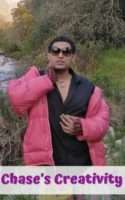We have the incredible honour of chatting with the talented Chase Rhys, a dynamic individual breaking barriers in the world of literature and storytelling. At just 30 years old, Chase has already made waves as a novelist, scriptwriter, and playwright. But what makes Chase truly unique is their unwavering commitment to self-expression, choosing the pronoun “they” to embrace their non-binary identity and defy gender norms.
Chase is popularly known for their work on the play, Kinnes, which was adapted into a film. They have also contributed short stories to anthologies Die Nuwe Afrikaanse Prosaboek and They Called Me Queer.
Fundza: Briefly share who you are and when you first realised you wanted to pursue writing as a career?
Chase: I didn’t know I was going to be a writer. I thought I was going to be an actor my whole life. I entered a competition. I had literally one day to write this short play and I sent it in. And I won that competition. The part of the prize was they put on the play. The play was very successful. And the publisher, Aquila publishers, approached me and asked me, “Can I turn the play into a book?” I said, yes. And then I became Chase the writer.
Fundza: What would you say is the most challenging part of being a writer?
Chase: The most challenging part is actually just sitting down and writing because I’ve got all the ideas in my head, I want to do this story. And then I want to do a story about that. And I will do just little notes, just ideas. So, the difficult part is sitting down and actually writing the stories.
Fundza: Do you have a specific writing process that you go through?
Chase: Depends on what I’m writing. So, for now, like I’m writing mostly columns (bi weekly column for Rapport newspaper and Netwerk24. My book misfit is a collection of those columns), because that is every second week, and I send in a column and my columns are about people. It’s not news. It’s not journalistic. What I often do is I take my phone out, and I record conversations that I’m having with a friend or whoever. I press voice record, just so that I can listen back to it. That would be my process, a lot of documenting, a lot of journaling, a lot of recording.
Fundza: Can you tell us a bit more on why writing in Afrikaaps is important to you and why you believe it’s an integral part of the South African culture and identity?
Chase: I had a cultural awakening. I think a lot of people have when it’s like, ‘Oh, they stole my culture, I am not linked to my roots. I don’t know where I come from, my heritage, my bloodline and what’s going on.’ And I was very angry in 2015 because of colonialism and all that stuff. And I thought, you know if I am if I’m going to have to speak English and Afrikaans, because that’s the only languages I know, I don’t know my indigenous languages – if I’m going to have to speak it, then I’m going to mess it up intentionally on paper. It was almost like a political statement to me.
We don’t need to change ourselves to fit this world, the world must welcome and accept us as we are.
Fundza: Can you share any details about your upcoming projects or works in progress, particularly the story you’re working on for Fundza?
Chase: It’s a non-binary character. We have this beautiful character, this beautiful, sensitive artist, who has a good connection with nature and water and art. And then we have this multi-billionaire technology advanced billionaire person who suddenly decides he’s going to move into the Cape Flats, because his nanny used to work here. And he’s going to move to because he’s got all sorts of technology that he wants to give the community, and he wants to help the people, like his nanny helped him. So, it’s about technology, versus nature, versus art. And how one young person can save the world literally.
Fundza: What advice would you give to someone who’s starting out as a writer or wants to start their writing journey?
Chase: Start documenting the people that you speak to and that you encounter every day. Just pay more attention to your life, to life. So, if you’re sitting in a taxi, or somebody in your class or anybody who goes to the shop. Listen to how they speak, pay attention to the words they use, because everybody speaks differently. Then going home at eight, this is just as an exercise, write down something that that person said. I always carry a notebook around me, and if I hear something funny or somebody says something interesting that I write it down.
Fundza: If you could co-write a book with any author, living or dead, who would it be and why?
Chase: Nathan Trantaal. He also writes in Kaaps, we come from the same community. I would like to see how we are similar and how we are different.
Fundza: What do you hope readers will take away from your writing?
Chase: I would like the readers to take away hope, a sense of hope, from my writing. Also, feelings, like laughing and cry, a mixture of those feelings, and I want them to be in awe and say, “Oh my word, how did this happen?”
***
You can read Chases’s Fundza story here.
Tell us: What did you take away from this interview?
Read more here about poet, Busiswe Mahlangu.


